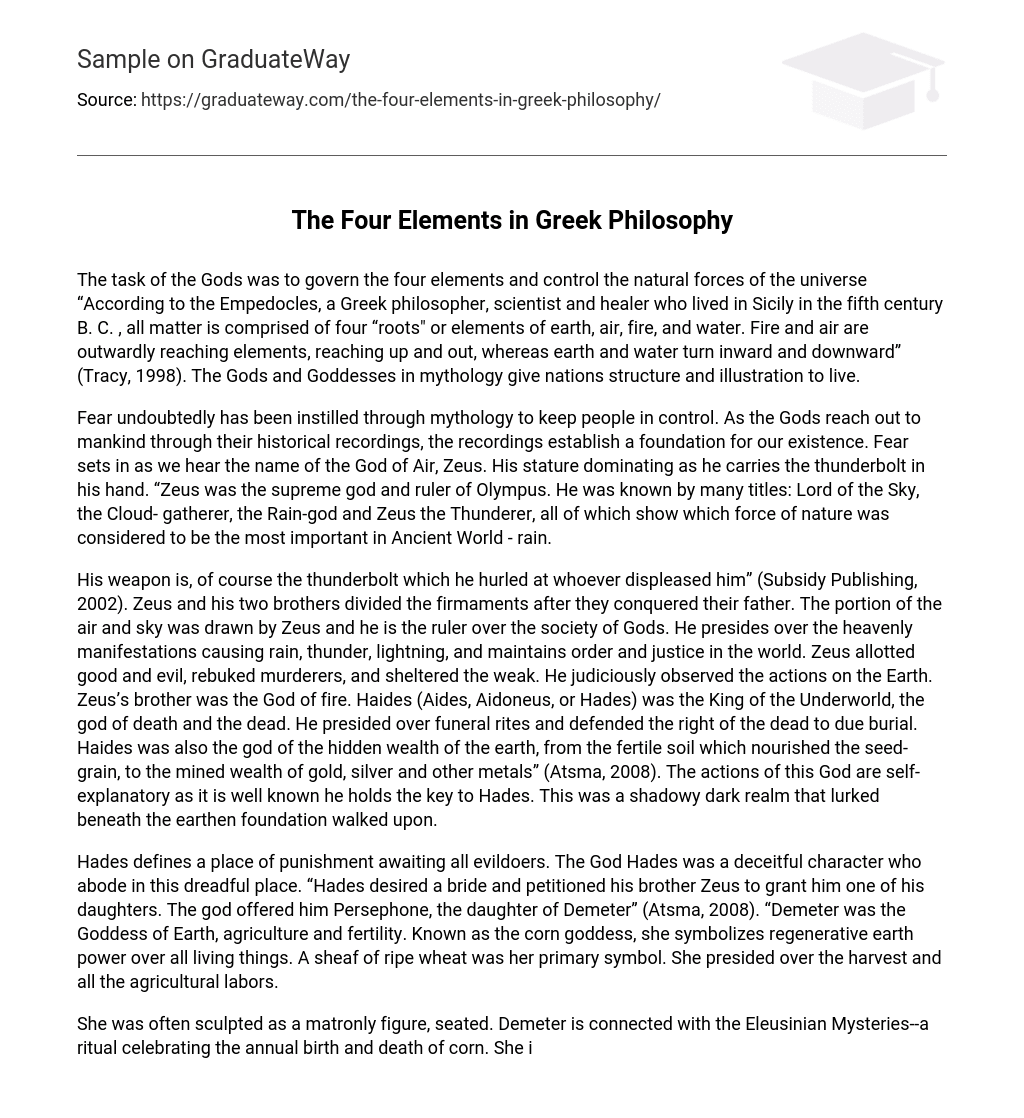Greek philosopher Empedocles, who lived in Sicily in the fifth century B.C., posited that the Gods’ purpose was to govern the four elements and regulate the natural forces of the universe. Empedocles maintained that all matter comprises four fundamental elements: earth, air, fire, and water. Fire and air expand outwardly, while earth and water move inward and downward. In mythology, the Gods and Goddesses offer nations structure and serve as role models for individuals to emulate (Tracy, 1998).
The use of mythology has undeniably instilled fear in order to maintain control over people. As the Gods communicate with mankind through their historical recordings, these recordings form the basis of our existence. When we hear the name Zeus, the God of Air, a sense of fear arises as we acknowledge his power and see him holding the thunderbolt. Zeus was the supreme god and ruler of Olympus, known by various titles such as Lord of the Sky, the Cloud-gatherer, the Rain-god, and Zeus the Thunderer. These titles highlight the significance of rain as the most important force of nature in the Ancient World.
His weapon is, of course the thunderbolt which he hurled at whoever displeased him” (Subsidy Publishing, 2002). Zeus, along with his two brothers, divided the firmaments after they conquered their father. Zeus claimed the portion of the air and sky and became the ruler over the society of Gods. He presides over the heavenly manifestations, such as rain, thunder, and lightning, and is responsible for maintaining order and justice in the world. Zeus assigned both good and evil, punished murderers, and protected the weak. He diligently observed the actions on Earth. Zeus’s brother was the God of fire. Haides (Aides, Aidoneus, or Hades) served as the King of the Underworld and was the god of death and the dead. He oversaw funeral rites and defended the right of the deceased to a proper burial. Haides also possessed control over the hidden wealth of the earth, from the fertile soil that nourished crops to precious metals like gold and silver” (Atsma, 2008). The actions of this God are self-explanatory as it is widely known that he holds the key to Hades— a dark and mysterious realm that lurked beneath the surface of the earth.
Hades is the ruler of a location of punishment for wrongdoers, and he lived there. He requested Zeus, his brother, for one of his daughters to marry. Zeus offered Persephone, who was the daughter of Demeter. Demeter was the Goddess of Earth, agriculture, and fertility. She was often referred to as the corn goddess and represented the powerful regenerative earth energy that influences all living beings. The primary symbol associated with her was a sheaf of ripe wheat. She had authority over the harvest and all agricultural activities.
Demeter, often portrayed as a nurturing figure seated, is connected to the Eleusinian Mysteries, a ritual that celebrates the cyclical birth and death of corn. Additionally, she is associated with providing sustenance for large populations (Nancy Creations, 2011). As the Earth Goddess, she ensures the fertility and vitality of plants, allowing for the yearly growth of new crops. Furthermore, Demeter possesses nurturing abilities and values family bonds. Disagreeing with Zeus’ decision to allow Hades to marry Persephone, who is both Demeter’s daughter and the Goddess of Water.
According to mythology, Hades’ intense anger led him to abduct Persephone and take her down to the underworld. In her distress, Demeter caused the plants to wither and die. Demeter convinced Zeus to return Persephone, and Hades agreed to release her under the condition that she had not eaten anything in the realm of the dead. “To everyone’s surprise, Persephone had consumed six pomegranate seeds.” Consequently, they made a deal: Persephone could spend half of the year on the surface with her mother, but for the other half, she would have to reside in the land of the deceased with her husband, who is also her uncle.
According to Carr (2011), the story explains that it has been this way since then, which is why we experience seasons. Demeter and Persephone reunite every spring to symbolize their reunion as mother and daughter through new buds and greenery. The four elements are essential for our survival as they nourish mankind in different ways. Belief in the Gods forms the basis of a culture’s faith, grounding their existence. These historical events aid in understanding the wonders of natural life.
References:
The sources below provide information on various Greek mythological figures and concepts:
– Atsma, Aaron. (2008). Theoi Project. Hades. Retrieved from, ttp://www.theoi.com/Khthonios/Haides.html
– Carr, Karen Dr. (2010). Kidipede, History for Kids. Persephone. Retrieved from, http://www.historyforkids.org/learn/greeks/religion/persephone.htm
– Nancy Creations. (2011). Goddess Archetype Demeter. A Brief Psychological Overview of Demeter. Retrieved from, http://goddess-power.com/demeter.htm
– Subsidy Publishing. (2002). Information about the Greek God Zeus. Retrieved from, http://www.zeus-publications.com/zeusgod.htm
– Tracy, Marks .(1998). Elemental: The Four Elements.Retrieved from,





